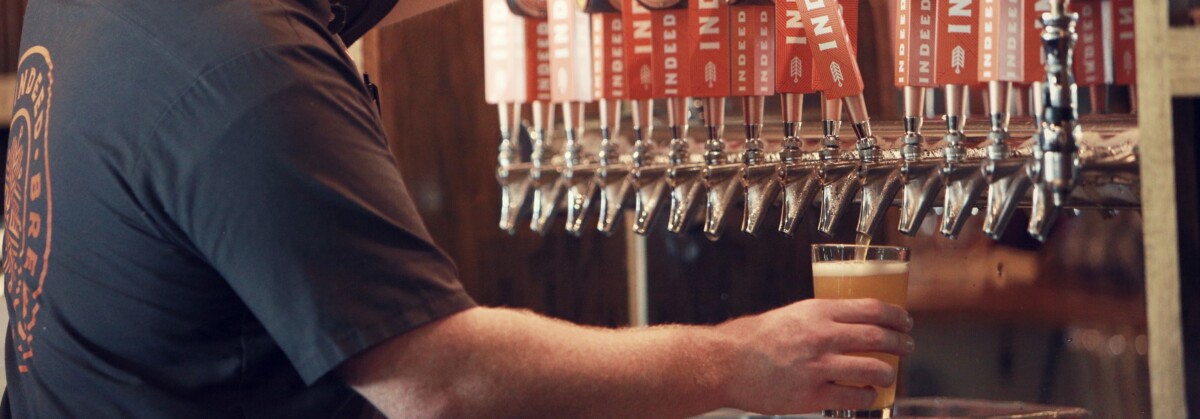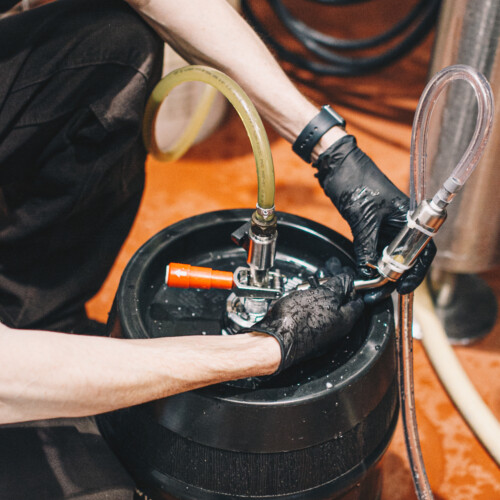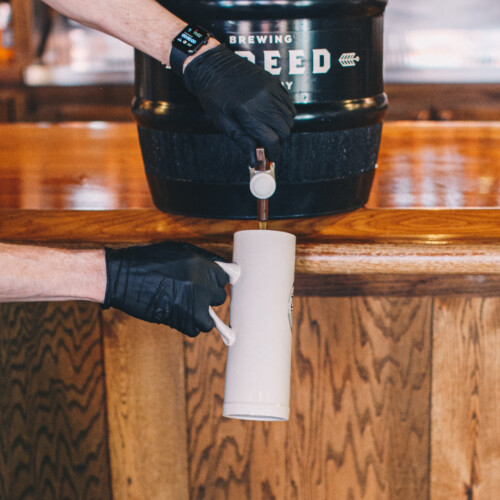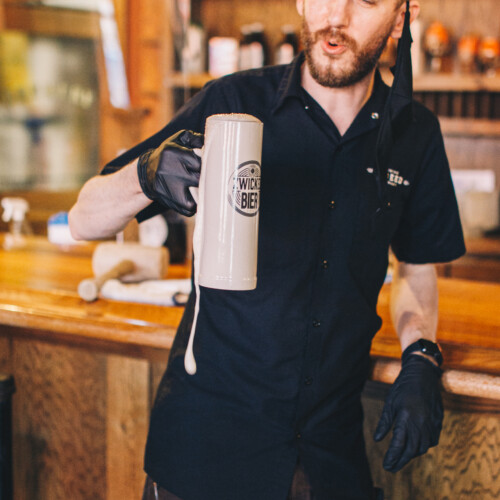Apr 8/21

Fassbier Friday
Get the freshest suds on Fridays.
Ever notice that little, black keg on the Indeed bar top? It might not look like much, but inside this fass keg is the freshest form of our beer for you to enjoy. Fassbier Friday is a unique beer experience at Indeed that allows you to drink like a brewer—straight from the fermentor. We talked to Jon Eager, Research & Development Brewer, to answer all of our fass questions.
What is fassbier? How is it different from the other beers on tap?
Fassbier (or fass beer) is the freshest, most unmessed-with type of beer one can possibly drink; it's essentially like drinking straight from the fermentors. It's relatively young beer pulled directly from the fermentor that is completely unfiltered and naturally carbonated. Drinking unfiltered beer allows the consumer to taste much more of the fermentation and yeast characteristics of the beer. The natural carbonation is achieved through a process called “spunding” where the CO2 produced as a byproduct from fermentation is only allowed to leave the fermentation vessel over a specific PSI during a specific phase of fermentation. This slowly forces the CO2 back into liquid suspension and creates smaller, more refined bubbles in your glass. Fun fact: All beers at Indeed utilize the spunding method, allowing us to simply “top up” carbonation after centrifugal clarification. Fassbier differs from other beers on tap not only in the above regards, but is also served in a bar top vessel called a “bierfass," which uses gravity rather than forced CO2 for service. Because of this, once a bierfass is tapped, it must be drunk the same day, usually within about 6-8 hours. Like many of life’s greatest things, fassbier is fleeting.
What exactly is the difference between filtered and unfiltered beer? How does it change the flavor experience of any given beer?
Filtration is one of the final steps in finishing beer. It is achieved in a variety of manners, most commonly plate filters or centrifugal force, but always results in the removal of solids on a microscopic level to enhance clarity, stability, and flavor in beer. Unfiltered beer is less stable, but when processed correctly can add unique characteristics to the drinking experience, allowing many of the yeast and fermentation flavors to be easier detected by the drinker.
What prompted you to start the Fass Friday program at Indeed?
I quietly launched the Fass Friday program at Indeed in early 2018, and Fass Friday is merely phase one of a bigger Bierfass Program swimming around in my head (thanks, Covid). I’m hoping to eventually expand the program a little once the pandemic is under control, as well as obtain a bit of a “crown-jewel” of fasses for big events—stay tuned for that down the road. I was initially inspired during a trip to Germany. Being a fan of smoked beers, naturally I found myself at Schlenkerla in Bamberg. They have these incredibly old bierfass that are always pouring behind this tiny one manned fass-bar, complete with a window to the streets for service as well. Drinking that fassbier felt like a VIP pass to the brewhouse to me, finally being able to drink the “true” version of these smoked beers I had loved for years. It was crazy seeing how quickly those fass were tapped and emptied, and I’m almost positive I witnessed one get tapped and poured entirely without the spigot ever closing. I knew immediately this was something I needed to capture and bring back to Indeed. After all, one of the best parts of being a brewer is drinking fresh beer right from the fermentor—why not bring that experience to the rest of the world?
How is a fass keg different from other kegs?
A modern day bierfass is essentially a small stainless interior bladder covered in a thick exterior rubber coating for insulation (traditional bierfass are made of oak with a neutral oak interior). Our fass have normal US snake necks on the top, but these are only used for initial filling and for ventilation during service. Service is achieved via driving a spigot into a side port with a mallet, similar to a cask, but modern-day fass have a one way port on the side for the spigot to prevent any beer explosions during the tapping process. The big difference between a bierfass and a cask, however, is there is no secondary fermentation process to achieve carbonation like there is in a cask. This eliminates the possibility of oxidation during carbonation and, to me, yields a far superior and consistent drinking experience.
How do you decide which beer will be on fass? Are there beers that are better suited for fass?
Every week, I check the status of our fermentors. I’m looking for beer that has been cold crashed for at least a few days, and has obtained at least 2.0 volumes of CO2 in liquid suspension. If the tank meets those criteria, I give it a taste test to ensure only the best of the best make the cut. It’s actually helped me retain more of a relationship with each batch of beer we brew, as it’s easy to forget which beer is where and how it’s progressing on the scale of brewing we do here at Indeed. I’ve learned the best beers for fass service are lagers, hands down. These styles of beers are often low in bitterness and have flavors that focus more on what the fermentation characteristics (yeast) contributes to the final product. But I’ve also found that hop-bursted beers and hazy IPAs work exceptionally well, too. The key in my mind is low bitterness.
What Indeed beers do you like to drink on fass?
Our Pilsner is nothing short of exceptional on fass and is probably the most common offering you’ll see in our taproom. After all, it won a bronze in 2018 at the European Beer Star awards for German Style Kellerpils (only American craft brewery to medal in a traditional German style that year, just sayin’). Outside of that, when available, I’ve been known to fill them with our Oktoberfest; our traditional German Springbier; a baltic porter we did once; Hello, Milwaukee; Mexican Honey; and even Flavorwave and our new Hazy IPA work fantastically.
In case someone isn't sold on fassbier at this point, tell us why it should be everyone's go-to choice.
It’s a great way to deepen the connection between yourself, the beer you are drinking, and the people who made it. It’s a bit of history in a glass, really. Humans have been drinking the equivalent of what fassbier is for centuries, long before the existence of modern-day service methods with pressurized kegs and forced CO2. It’s like a sneak peak into an early life phase of a beer you normally wouldn’t have access to. You should choose a fass pour when available not only because of these reasons, but also because it’s a very small, hand-curated, and limited offering selected because of a batch's individual greatness. It can be appreciated by the novice and connoisseur alike, and there is truly nothing quite like a fresh fass pour!
Fassbier is available every Fridays in the Northeast Minneapolis and Milwaukee taprooms; pints are $5. Follow us on Instagram (@indeedbrewing and @indeedmilwaukee) and check our stories weekly for which beers will be available on fass. Make a reservation at the Northeast taproom here.




